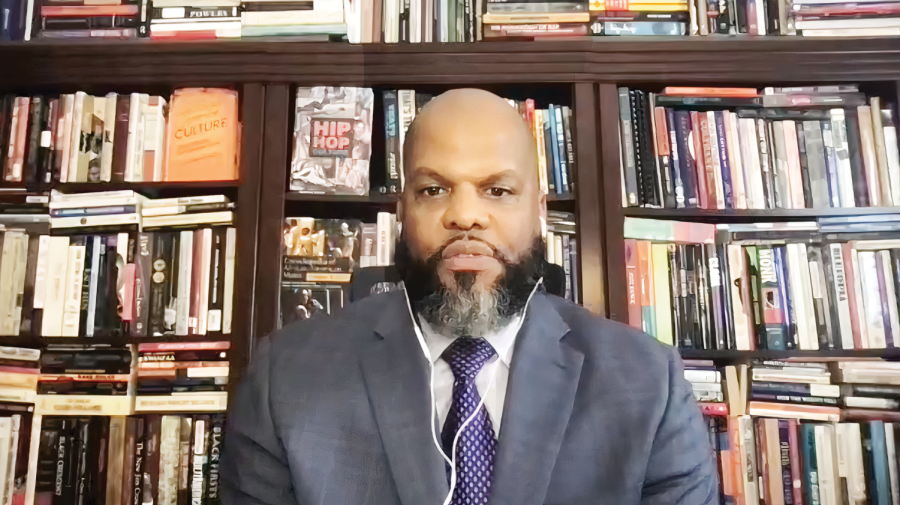Alumnus and scholar speaks during Community Flex Time webinar
Lucas Cohen-d’Arbeloff/Chronicle
Dr. Emmett G. Price III ’92, the the inaugural Dean of Africana Studies at Berklee College of Music, recalls core memories from his time at the school, including harrowing experiences of racism on campus.
February 12, 2022
Black Leadership Awareness and Culture Club (BLACC) hosted educator, musician and speaker Dr. Emmett G. Price III ’92 in a webinar honoring Black History Month on Feb. 7. Price, who serves as the inaugural Dean of Africana Studies at Berklee College of Music, spoke to the community about his experience at the school and contemporary issues of racism. The virtual event featured student performances and a Q&A session, with students joining the webinar from their classrooms.
The meeting opened with Olivia Sparks ’22 reading an original spoken word poem about the experience of Black people in America and performing a dance celebrating the beauty of natural Black hair. BLACC leaders Ash Wright ’22 and Eghosasere Asemota ’22 discussed the significance of Black History Month and introduced Price, who took part in the inaugural year of BLACC when he attended the school.
Price reflected on his experience as a Black student dealing with racist experiences in the Studio City community.
“Every now and then, some of the neighbors of the school on Coldwater Canyon intentionally called the police on us,” Price said. “For whatever reason, I guess we didn’t belong in the neighborhood. And there were a number of times where a few of us ended up in the backseat of police cars with handcuffs on, trying to call the school—we didn’t have cell phones back then, of course—trying to petition the police officers to call the school so that the school could vouch that we were students and that we belonged in the neighborhood and in the community.”
Price said he also faced racism on campus, citing a teacher who accused him of academic dishonesty and insisted he was incapable of producing strong writing.
“I remember a teacher who passed away a number of years ago, who accused me of plagiarism in the classroom,” Price said. “I’ll never forget I had to call my father, and he had to take off from work to come up to the school and share with that teacher that I didn’t plagiarize, but that he had helped me with my homework. As he asked the teacher what citation she was looking for, and where I plagiarized the [assignment] from, all the teacher could say was, ‘Well, I just know he didn’t write this. I know he didn’t write this.’”
Although he said he experienced racial bias on campus, Price also shared positive memories from his years at the school, such as working to keep up in Latin class and learning the importance of teamwork while playing basketball. He said several teachers made an impact on him and helped shape his career path.
“I think about folks like John Thomas West, who was my guidance counselor,” Price said. “In my senior year, as I was graduating, I did an independent study with him that actually birthed my scholarly interest in the Black American cultural experience, both musically but also in terms of broader culture.”
BLACC leader Camryn Williams ’22 said she noticed significant parallels between the current Black experience at the school and that of Price several decades ago.
“It was really important that Dr. Price had a lot of experiences that lined up with several of the Black students at our school currently,” Williams said. “I think it was very impressive how much he’s accomplished since graduating, how he was able to overcome all the setbacks he experienced while attending [the school], was able to turn it into a positive thing and is now able to talk to us about it and inspire us.”
After the virtual event concluded, Williams said she was saddened to hear many students were distracted by their surroundings and did not lend their full attention to Price’s words.
“The thing about this Community Flex Time was that a lot of people didn’t think it was mandatory,” Williams said. “Some people that I had talked to afterward were expressing to me how they sort of tuned out, and they were mainly the students that were not of color. I think that those are the people that honestly needed to hear [Price’s] words the most. So that was a little disappointing, but I think other people that were paying attention will definitely [be impacted] from hearing him.”
Singer-songwriter Kiki Cooper ’23 said she admires how Price has used music to advance social change and cultural expression throughout his career.
“As a musician myself, I really appreciated how he talked about how powerful music can be in terms of topics of race, and how it can bring a lot of people together,” Cooper said. “Just knowing how influential he can be, and how [music] can give people strength in times when he himself experienced incidents due to his race, he took a lot of those as important opportunities to learn and be inspired. I really liked how he intertwined music with his overall message.”































